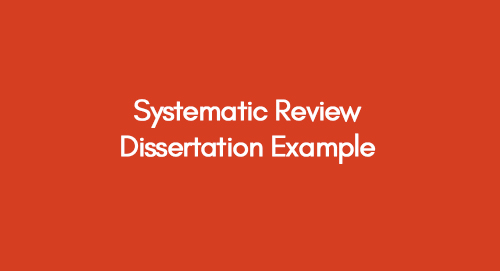
First Class Dissertation Examples
April 28, 2023
Systematic Review Dissertation Example
April 28, 2023A qualitative dissertation is a piece of writing that explores and analyzes a phenomenon or a research issue using qualitative research methodologies. This dissertation style is frequently employed in the social sciences, education, and psychology areas. Through various qualitative research techniques, including interviews, observations, and document analysis, a qualitative dissertation seeks to comprehend and interpret its participants' meanings, experiences, and perspectives.
In this blog post, we will take you through qualitative dissertation examples to help you understand how to incorporate data into your qualitative dissertation like a pro.
Qualitative Method for Dissertation Writing
The methodologies implemented in qualitative research are often characterized by their subjective and malleable nature. Consequently, it is paramount to provide a comprehensive and thorough clarification of the technique employed in a study. That entails explaining the criteria utilized to select the data, the context in which the research was conducted, and the researcher's involvement in data gathering.
- To begin with, purposeful sampling is typically the criterion for selecting data in qualitative research.
- This approach involves the researcher selecting participants with particular characteristics or experiences pertinent to the research question being investigated.
- This methodology allows for collecting rich and detailed data that can be deeply examined.
- Furthermore, the context in which the research is carried out is crucial in conducting qualitative research.
- Researchers must be attuned to the social, cultural, and historical contexts shaping participants' experiences and perspectives.
- It enables researchers to develop a nuanced and contextualized comprehension of the phenomenon under investigation.
Qualitative Dissertation Example
A qualitative dissertation requires an analytic approach to every research you conduct. And to get a comprehensive approach to getting through your task every time, make sure to follow qualitative dissertation examples crafted by proactive writers.
Here are some of our handpicked qualitative dissertation examples for your assistance.
Example 1: An Ethnographic Study of Homeless Youth in Urban Areas
Research Background: This ethnographic dissertation examines the experiences of homeless youth in urban areas. The researcher conducted participant observation and semi-structured interviews to gain a deep understanding of this vulnerable population's daily lives and struggles.
The study identified several themes, including the challenges of accessing basic necessities such as food and shelter, the impact of trauma on mental health, and the importance of supportive relationships and community connections. The findings highlight the complex and multifaceted nature of homelessness among youth and the need for comprehensive and holistic approaches to addressing this issue.
In this qualitative dissertation example, the researchers employed qualitative research methods to understand complex social phenomena in-depth. The studies demonstrate the value of qualitative research in uncovering the lived experiences of marginalized populations and the importance of tailoring support and resources to address their specific needs. By emphasizing individuals' unique perspectives and voices, qualitative research provides a valuable perspective on social issues often overlooked in more quantitative approaches.
Example 2: Exploring the Role of Mindfulness-Based Interventions in Reducing Stress and Burnout among Healthcare Professionals
Research Background: This qualitative dissertation aims to investigate the effectiveness of mindfulness-based treatments in relieving stress and burnout among healthcare workers. The researcher conducted in-depth interviews to fully understand a chosen sample of healthcare workers who participated in a mindfulness-based intervention.
The study exposes numerous key themes, including the influence of mindfulness on stress reduction and emotional regulation, the importance of self-care and self-compassion, and the potential for mindfulness to improve patient care and communication. The study sheds light on the efficacy of mindfulness-based therapy, which may be ignored in more quantitative techniques. The qualitative research approach highlights participants' subjective feelings and opinions, providing an insightful viewpoint on the advantages of treatments.
The results imply that mindfulness-based treatments improve healthcare personnel's efficiency and general well-being. These therapies are a useful way to reduce stress and burnout in this group.
Types of Qualitative Methods in Dissertation
Qualitative research methods are several and adaptable, giving researchers a variety of instruments to examine complicated phenomena thoroughly. One or more of the following techniques may be used by a researcher when conducting a qualitative dissertation:
- In-depth interviews
A qualitative research method known as "in-depth interviews" entails one-on-one conversations with participants to collect rich and extensive information about their experiences, perspectives, and opinions. The interviews might be structured, semi-structured, or unstructured, depending on the research technique and the relevant research issue.
- Focus groups
With this approach, participants gather for a facilitated discussion or chat on a certain subject. Focus groups can offer insightful information on group dynamics, general viewpoints, and shared experiences.
- Participant Observation
Observing people in their natural context and recording their behaviours, interactions, and experiences is known as participant observation and is a qualitative research technique. Depending on the study issue and technique, either an active or passive approach can be used with this strategy. This approach gives researchers access to information that isn't always available through interviews or surveys and offers a useful perspective on the actions and experiences of the study subjects.
- Case Studies
A case study is a qualitative research technique that thoroughly examines a specific instance or event to produce a complete knowledge of it. The goal of this method is to determine the underlying mechanisms and contributing elements by closely investigating one specific occurrence. This approach is especially useful when it is challenging to extrapolate results from one context or demographic to another and when a thorough comprehension of a specific instance is required.
- Narrative Analysis
To find themes, patterns, and meanings, narrative analysis—a qualitative research technique—involves looking into human experiences, tales, or narratives. This method is ideal for examining people's experiences and unbiased perceptions of what happened.
Researchers can thoroughly grasp how individuals interpret their environment and the significance of personal experience in forming their viewpoints by concentrating on the narrative components of communication. Finding the underlying meanings and emotions frequently concealed in other types of data may be accomplished with the help of narrative analysis.
- Content Analysis
This technique includes looking for themes, patterns, and meanings in textual, visual, or aural content. Examining media, papers, or other kinds of communication may be done using content analysis.
- Grounded Theory
This approach creates a hypothesis or framework using the information gathered from study participants. New concepts and insights can be developed using data and participant experiences in conjunction with grounded theory.
Conclusion
In conclusion, qualitative dissertation examples demonstrate the importance of employing various methodologies to collect and analyze data. By utilizing the methods mentioned above, researchers can comprehensively understand the phenomenon they are studying.
You can contact our professional writers at Premier Dissertation anytime for more academic assistance.
Get 3+ Free Custom Examples & Topics within 24 hours;
Get an Immediate Response
Discuss your custom requirements with our writers
Free Online Plagiarism Checker For Students
We will email you the report within 24 hours.
Upload your file for free plagiarism





























